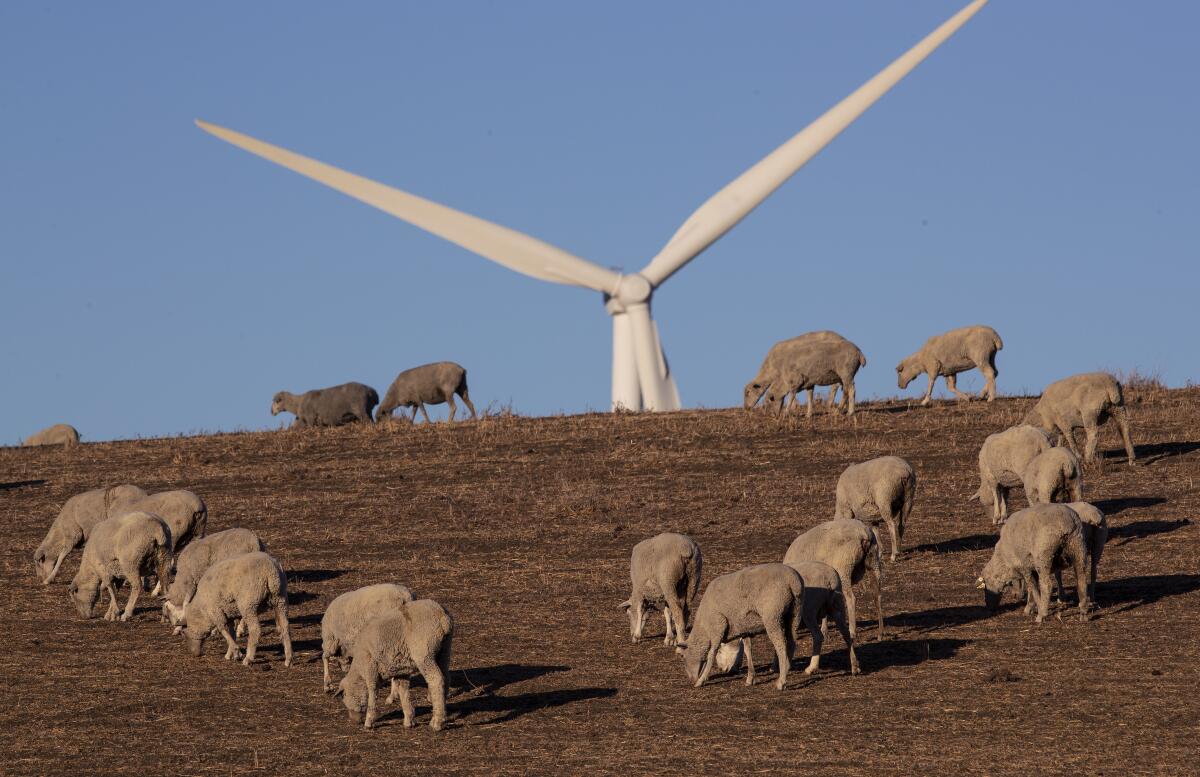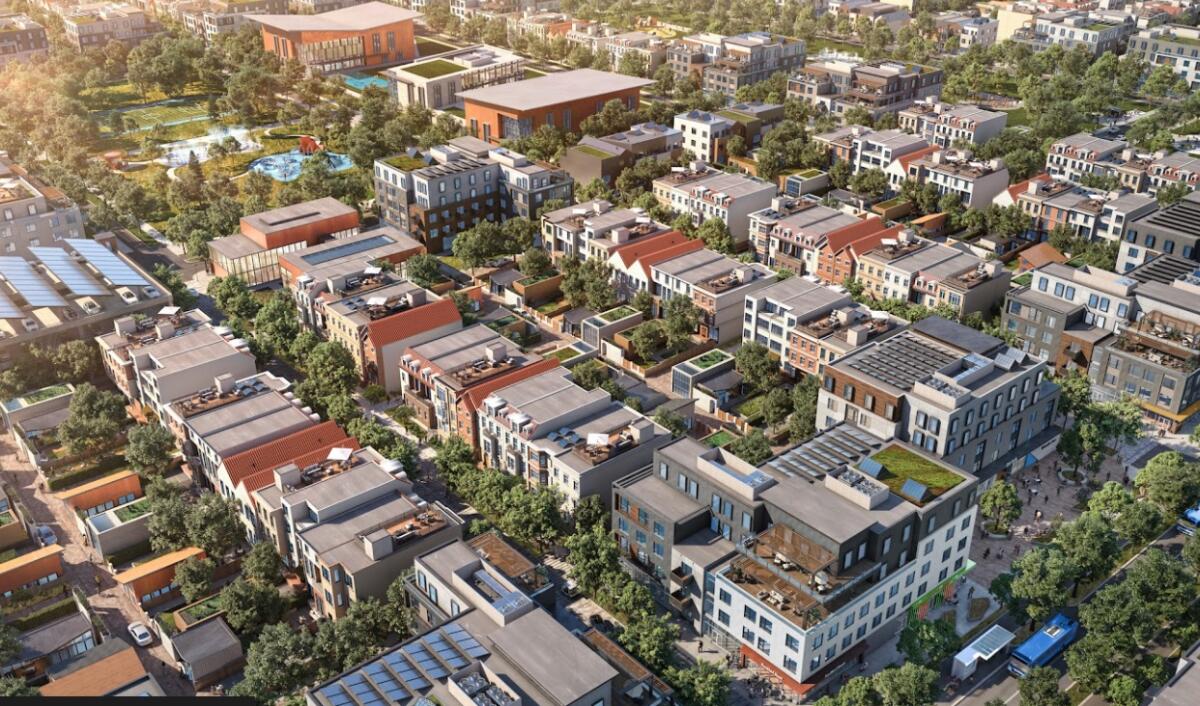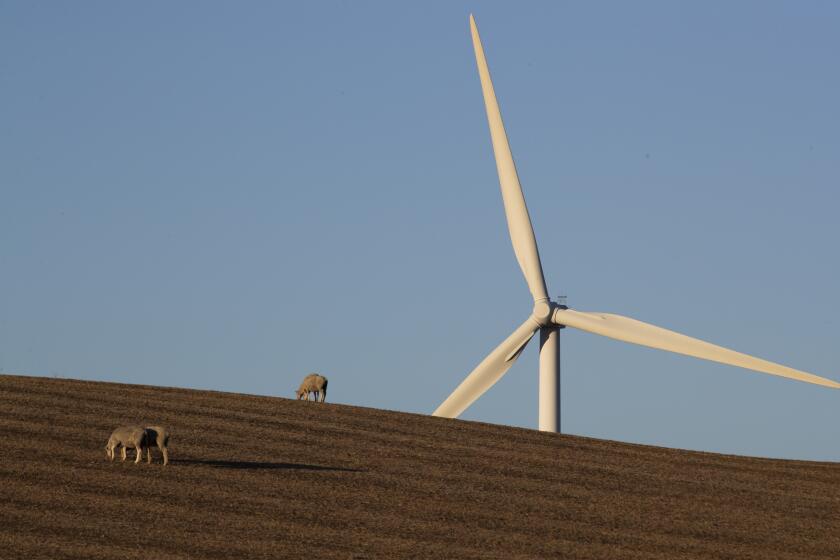Billionaire-backed futuristic city no longer shrouded in secrecy. Here are the details

- Share via
RIO VISTA, Calif. — The tech billionaires who for years secretly amassed land in the scrubby grasslands on the fringe of San Francisco Bay announced Wednesday that they will begin gathering signatures for a ballot initiative in Solano County that would clear the way to build a city from scratch.
The group, called California Forever, envisions a community with tens of thousands of new homes, along with crisp new parks, bike lanes, open space and a solar farm. The model city would be walkable, socioeconomically integrated and fueled by clean energy.
But to get there, the backers will have to persuade Solano County voters to approve the sweeping endeavor. That could be a tough hurdle considering that the project for so long was shrouded in mystery and became ensnared in controversy last year amid unfounded speculation that the land buyers were foreign agents intent on espionage. Federal, state and local approvals will also be required.
The first stage of that campaign took place Wednesday, when Jan Sramek, chief executive of California Forever, took to a podium in the Veterans Hall in the Sacramento-San Joaquin Delta town of Rio Vista to pledge that the project would be a “great neighbor” to everyone in the county.
Sramek, a former Goldman Sachs trader, has said his vision for the city coalesced while he was on a fishing trip in the nearby delta. He and other speakers listed a long series of benefits that they say would result from raising a new city on a rolling expanse now dedicated to ranching and wind farms.
Among them: a pledge to create at least 15,000 jobs; $500 million to assist with down payments for housing, scholarships and other benefits for residents; $200 million to revitalize the downtown cores of existing Solano County communities such as Rio Vista, Benicia and Dixon; and commitments to preserve open space, create walkable neighborhoods and improve traffic flow and safety on nearby roadways.
Each of those benefits are codified into the ballot language that voters could see in November if the measure makes it that far, Sramek said.
Theoretically, the new city could have a population of several hundred thousand people. Plans call for it to rise on 18,000 acres just west of Rio Vista, a town of about 10,000 people on the Sacramento River. The city would be separated from Rio Vista by 712 acres of parkland, sports facilities and open space.
But that is a long way off. If the ballot measure is approved, other government approvals would then be required. Environmental groups have signaled lawsuits are possible, which could tie up the matter in court. The soonest construction could begin is 2026.
The project, Sramek said, would be “tens of billions of dollars” of investment when fully built and could “change the conversation” about California. He noted that the state is dogged by allegations that it has become a punishing place to live because of its sky-high housing and rental prices and soul-crushing commutes, gridlock and sprawl.

The public campaign is a stark departure from the project’s origins years earlier, when a mysterious LLC called Flannery Associates began buying thousands of acres of Solano County farmland and pasture. The purchases, which totaled more than $800 million, made millionaires out of some property sellers, many of whose families had owned the land for more than a century.
Flannery Associates for years declined to reveal its backers or explain why they were spending millions to obtain vast acreage that for decades had been devoted to grazing and has more recently been dotted with wind turbines.
Because so much of the land is near Travis Air Force Base, some residents and elected officials speculated that Flannery Associates was a front for foreign investors seeking to spy on the base, one of the busiest military facilities in the nation.
U.S. Rep. John Garamendi (D-Walnut Grove), who represents the region, said last year that he and other officials had been unable to determine who was behind the dizzying land acquisition and criticized the company for not working with locals. “Flannery Associates is using secrecy, bully and mobster tactics to force generational farm families to sell,” the congressman said.
Ultimately, the backers were revealed not as spies but as titans of the tech industry. LinkedIn co-founder Reid Hoffman, venture capitalist Marc Andreessen, and Patrick and John Collison, who founded the payment-processing company Stripe, are among those who have invested in Sramek’s idealistic vision of a bold new community that would help ease the state’s housing shortage — and the project’s profit potential.
The billionaires behind Flannery Associates have bought up more than 140 parcels in Solano County with dreams of ‘a new city with tens of thousands of new homes.’
Organizers of Wednesday’s event brought in residents who favor the undertaking to tell the assembled media why.
Patrice Lewis of Vallejo said she was “elated” about the potential of a sparkling new city. Lewis, who is Black, said she believed the project had the potential to bring more equity to the county and to boost the fortunes of neighboring Vallejo.
Annie Vogelphohl, 81, said she was a real estate broker and excited at the idea that her grandchildren could one day buy houses in the new city.
Not everyone, however, is a convert.
The Solano County chapter of the Sierra Club has come out against the project. “We don’t think we need housing on agricultural land,” said Joe Feller, former chair of the Solano Group of the Sierra Club. Despite all their talk of idealized communities and being good neighbors, Feller said, what the backers of California Forever really want is “to make money.”
State Sen. Bill Dodd (D-Napa), who represents the area, said he is not yet convinced of the project’s feasibility. “They’ve certainly put plenty of money and time into their proposal, but there are still huge unresolved issues like traffic, and I’m not sold,” he said in a statement.
If the measure qualifies for the ballot, Dodd said, he hoped Solano County voters would make their decision “based on facts, not slogans, misdirection and massive campaign spending. We shouldn’t gloss over very important public policy considerations that will have generational impacts.”
Outside the meeting hall, some residents waited for the media in the parking lot. They had not been allowed in, they said, but had major concerns, including whether such a project would generate dangerous traffic and sprawl.
Among them was Kathleen Threlfall, who carried a sign that said: “Not Invited.” Threlfall, who lives in her great-grandparents’ house, said her family has been farming in the area for more than a century and was among those who refused to sell their land to the group pushing the new city.
More to Read
Sign up for Essential California
The most important California stories and recommendations in your inbox every morning.
You may occasionally receive promotional content from the Los Angeles Times.















